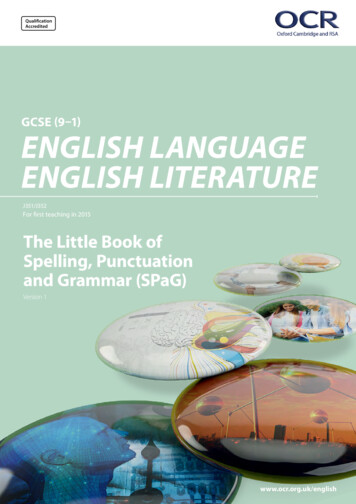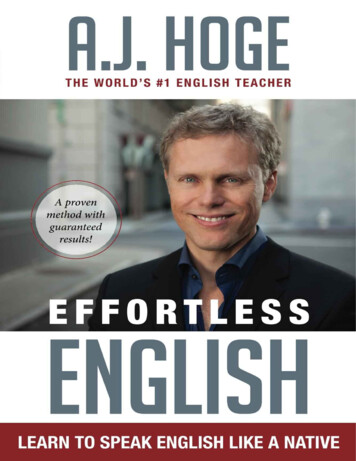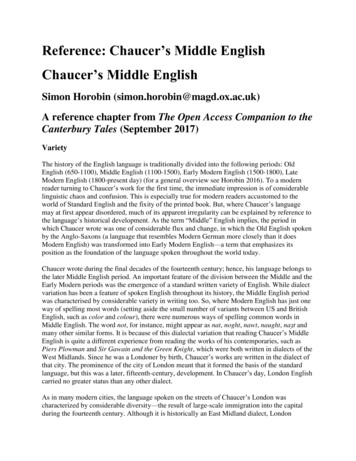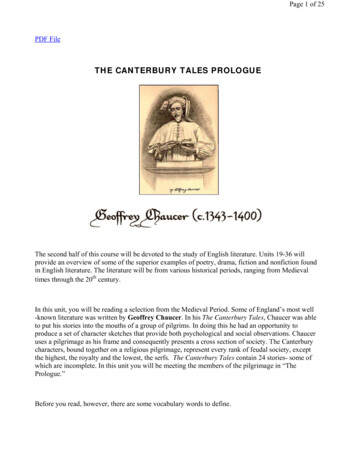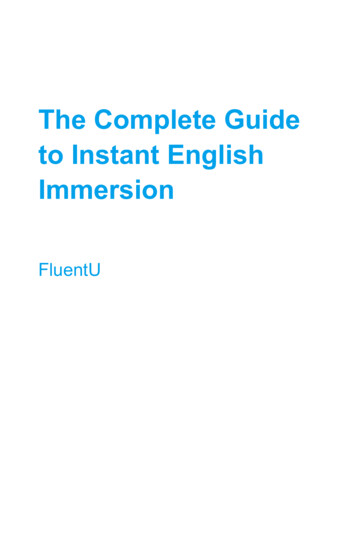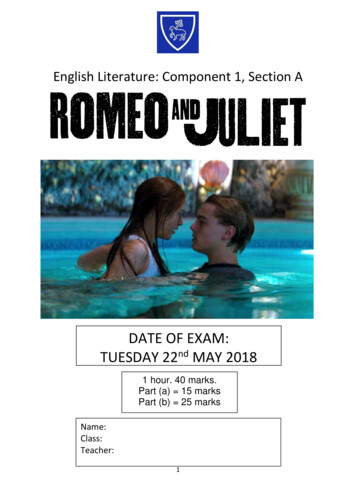
Transcription
English Literature: Component 1, Section ADATE OF EXAM:TUESDAY 22nd MAY 20181 hour. 40 marks.Part (a) 15 marksPart (b) 25 marksName:Class:Teacher:1
2
3
Learn it!Use it!4
When?Act 1 – PrologueAct 1, Scene 1:Verona. A publicplace.Act 1, Scene 2: Astreet.Act 1, Scene 3: Aroom in Capulet'shouse.Act 1, Scene 4: Astreet.Act 1, Scene 5: Ahall in Capulet'shouse.Act 2, Prologue:PROLOGUEAct 2, Scene 1: Alane by the wall ofCapulet's orchard.Act 2, Scene 2:Capulet's orchardAct 2, Scene 3: FriarLaurence's cell.Act 2, Scene 4: Astreet.Act 2, Scene 5:Capulet's orchard.Act 2, Scene 6: FriarLaurence's cell.Act 3, Scene 1: Apublic place.Act 3, Scene 2:Capulet's orchard.What happens?Find out the story in a condensed versionServants of the Montagues (Romeo) and Capulets (Juliet)start street brawl showing rivalry and tension between thefamilies. We discover Romeo loves Rosalind.Paris asks Capulet if he can marry Juliet. Romeo discoversthat Rosalind will be at the Capulet ball that evening.Lady Capulet tells Juliet about Paris’s proposal. The nurseinterrupts with a long story of her as a baby.Romeo has a feeling that something terrible will happen if hegoes to the ball but he goes anyway.The Montagues go to the ball and Romeo forgets Rosalind assoon as he sees Juliet. Tybalt recognises them but LordCapulet will not allow a fightThe chorus informs us the pain R&J are in as they can’t meetbut passion will find a way.Romeo jumps into the Capulet garden to catch a glimpse ofJuliet.The Balcony Scene: Romeo professes his love to Juliet. Theyarrange a meeting.Romeo goes to Friar Lawrence to arrange to marry Juliet – heagrees thinking it will end the feud between the familiesTybalt sends a challenge to Romeo. The Nurse gets theinformation about the wedding as a message to Juliet.The nurse delivers the news to Juliet of her upcomingmarriage to Romeo.They marry.Romeo tries to avoid fighting. Mercutio is wounded and killedby Tybalt. Romeo then avenges his death and kills Tybalt.Romeo is exiled for his part in this.Juliet learns of Tybalt’s death and Romeo’s banishment and isdistraught over the loss of her love.5
Act 3, Scene 3: FriarLaurence's cell.Act 3, Scene 4: Aroom in Capulet'shouse.Act 3, Scene 5:Capulet's orchard.Both Romeo and Juliet are distraught at the separation.Romeo tries to stab himself but is convinced to hold on byFriar Laurence.Capulet promises on impulse that Juliet will marry Paris intwo days.Lady Capulet informs Juliet of her upcoming marriage. She isthreatened by her father if she refuses to be thrown out. TheNurse says she should marry Paris.Act 4, Scene 1: Friar Friar plans to give Juliet a drug that makes her appear deadLaurence's cell.for 48 hours to escape for Mantua and a new life with RomeoAct 4, Scene 2: Hall Juliet goes to her father and agrees to marry Paris. He movesin Capulet's house.the wedding forward a day.Act 4, Scene 3:Juliet takes the poison.Juliet's chamber.Act 4, Scene 4: HallCapulet sends the nurse to waken Juliet.in Capulet's house.Act 4, Scene 5:The Nurse tries to wake Juliet, but finds that she isJuliet's chamber.(apparently) dead. All are grief stricken but Friar Laurencearranges the funeral quickly.Act 5, Scene 1:Romeo hears wrongly of Juliet’s death, buys poison andMantua. A street.returns to join her.Act 5, Scene 2: FriarFriar John explains why he didn’t deliver the letter and F LLaurence's cell.sends another.Act 5, Scene 3: AOutside the tomb where Juliet is (apparently) dead. Romeochurchyard; in it aand Paris fight. Paris is killed. Romeo takes the poison andtomb belonging todies. Juliet wakes and finding Romeo dead kills herself withthe Capulets.his dagger.6
Who’s who in this fatal game of love?MontaguesRomeo: Our main male protagonist, about 16. Falls in love easily, rejects his familyfor love of Juliet, hot-headed, kills Tybalt (Juliet’s cousin), marries young and diestragically.Lord Montague and Lady Montague: father and mother to Romeo, maintains thefeud between the Capulets and the Montagues. Lady M shows maternal instinct andcaring for Romeo – she dies heartbroken at the end.Mercutio: A family member of the Prince, and Romeo's best friend.Benvolio: Montague's nephew, Romeo's cousin and thoughtful friend, he makes agenuine effort to defuse violent scenes in public places, though Mercutio accuses himof having a nasty temper in private. He spends most of the play trying to help Romeoget his mind off Rosaline, even after Romeo has fallen in love with Juliet.Balthasar: Romeo's dedicated servant, who brings Romeo the news of Juliet's death,unaware that her death is a ruse.Abram: Montague's servant, who fights with Sampson and Gregory in the first sceneof the play.CapuletsJuliet: Our main female protagonist, she is 13 years old. She falls in love quickly andcompletely, rejects the rules of her family and patriarchy, considered in some of heractions, impulsive when emotional, marries young and dies tragically.The Nurse: Juliet’s companion and confidante, like a mother to Juliet,unquestioningly helps Juliet marry Romeo, advisor and friend.Lord Capulet: Juliet’s father, arranges her marriage to Paris, no consultation withJuliet on this, disowns her and is rude and angry towards her when she disagrees,epitomises the patriarchal society, rules his home with an iron fist, makes all theimportant decisions, agrees to let old quarrels die after the death of JulietLady Capulet: Juliet’s mother, distant from Juliet, non-maternal, very young (impliesshe was 13 herself when she had Juliet – which means she is only 26 in the play!),does as Lord C tells her, could be considered a victim of the patriarchal societyTybalt: Juliet’s cousin, Prince of ‘Cats’. Leader of the Capulet gang, vain, fashionable,supremely aware of courtesy and the lack of it, he becomes aggressive, violent, andquick to draw his sword when he feels his pride has been injured. Once drawn, hissword is something to be feared. He hates Montagues.7
Paris: A kinsman of the Prince, and the suitor of Juliet most preferred by Capulet.Once Capulet has promised him he can marry Juliet, he behaves very presumptuoustoward Juliet, acting as if they are already married.Peter: A Capulet servant who invites guests to Capulet's feast and escorts the Nurseto meet with Romeo.Rosaline: The woman with whom Romeo is infatuated at the beginning of the play.Rosaline never appears onstage, but it is said by other characters that she is verybeautiful and has sworn to live a life of chastity.Sampson & Gregory: Two servants of the house of Capulet, who, like their master,hate the Montagues. At the outset of the play, they successfully provoke someMontague men into a fight.Peter: A Capulet servant who invites guests to Capulet's feast and escorts the Nurseto meet with Romeo.Characters Non-Affiliated to a familyFriar Laurence: Priest who secretly marries Romeo and Juliet in hopes that the unionmight eventually bring peace to Verona.Paris: A kinsman of the Prince, and the suitor of Juliet most preferred by Capulet.Once Capulet has promised him he can marry Juliet, he behaves very presumptuoustoward Juliet, acting as if they are already married.Prince Escalus: The Prince of Verona. A kinsman of Mercutio and Paris. As the seat ofpolitical power in Verona, he is concerned about maintaining the public peace at allcosts.8
NOTES ON THE PLAYFate and Tragic TimingThe tragic events of this play often seem like matters of badtiming. Romeo steps in front of Mercutio at the exact secondthat Tybalt lunges; the Friar’s explanatory letter to Romeo isdelayed, so Balthazar’s misinformation reaches him first;Romeo drinks the poison mere moments before Juliet opensher eyes. These instances of close timing make the play evensadder than it otherwise would be, because we can see thatthe difference between life and death was just a fewseconds. A moment earlier, or a moment later, andeverything would have been okay. Individually, thesemoments of tragic timing look like awful accidents, but whentaken all together, they seem more like the work of fate.The theme of fate and foreboding turns up repeatedly in theplay’s language. On the way to the Capulet ball, Romeouneasily senses the approach of “Some consequence yethanging in the stars”— he has a premonition of doom. Afteravenging Mercutio’s death by killing Tybalt, Romeo callshimself “fortune’s fool”—he feels that he has been cheatedby fate. As the lovers part at daybreak, Juliet envisionsRomeo “dead in the bottom of a tomb”, although she has noreason to think that he will soon die. When Romeo hearsfrom Balthazar that Juliet has died, he shouts his defiance tothe stars, demonstrating that he blames fate for the tragedy.In the play’s prologue, Romeo and Juliet are called “starcrossed”, and their love is referred to as “death-marked”.These terms indicate that the lovers were destined to dietragically. But are the play’s events really the result of fate?Do you think that the teens from Verona were doomed fromthe start, or could this tragedy have been prevented? What factors stopped Romeo and Julietfrom living happily ever after?Warring Families, Warring GenerationsThe most obvious impediment to Romeo and Juliet’s love is the feud between their parents. Thebad blood between the Capulets and the Montagues makes any romance between their heirsdangerous and forbidden. We know that the two families hold an “ancient grudge”—a hate sostrong and deep-rooted that their servants fight in the streets. What the play doesn’t tell us iswhy this feud exists. What happened? Who started it? The audience isn’t given any of thesedetails. It is as though the two households have been fighting for so long that they have forgottenwhy the fight started in the first place. This ambiguity makes the play’s feudal violence and9
eventual loss of life seem all the more unfair and pointless. Why should the young people ofVerona kill each other over an argument begun by their ancestors? Why should two youngpeople in love be kept apart because of a war that they had nothing to do with?These questions point to another conflict in the play: that between youth and age. Romeo andJuliet are stuck in the midst of warring families, but they are also two young people forced to liveunder the rules and values of their parents’ generation. Romeo and Juliet’s love must be keptsecret because it would not be understood or tolerated by the rest of society. Even the adultswhom the teenagers trust for advice (Friar Laurence and the Nurse) don’t fully understand theintensity of their feelings. The adults of the play are weaker, slower, and less impassioned thantheir younger counterparts. Juliet comments that “old folks” are “unwieldy, slow, heavy”, and herdawdling Nurse exemplifies this behavior. In contrast, the young people of the play move fast andfeel deeply. Their tempers ignite in an instant, and so do their feelings of love.These Violent Delights Have Violent Ends: Youth, Love, and ViolenceRomeo and Juliet fall deeply in love at first sight, andmake plans to marry each other mere hours after they meet.This is a fast-moving relationship by any standards! Just like theviolent encounters between the Capulets and the Monagues,their love fires up immediately. Although it seems incrediblyromantic to fall for someone instantly, Friar Laurence warnsRomeo that this kind of speed can be dangerous. He cautionshim to “love moderately” and to act “wisely and slow”. Do youthink that this advice is helpful, or does Friar Laurence just notunderstand what Romeo is going through? Does Friar Laurenceactually do anything to try to slow down the young couple’srelationship, or does he ignore his own advice?Later in the play, when Romeo and Juliet are faced with theprospect of a life without one another, their extreme loveturns into extreme grief. Their intense feelings drive them tocommit suicide. Do you believe that “violent delights” always“have violent ends”, and that people “who run fast” necessarily stumble? Are these intenseemotions and extreme feelings an accurate representation of what it’s really like to be a teen?Have you ever felt like your love for someone else was the only thing in the world that mattered?Have you ever been so sad that you felt like things would never get better?But soft, what light through younger window breaks?Light and Darkness in ROMEO & JULIETThis play is filled with references to light and darkness. When we first hear about Romeo, he isdescribed as shutting “fair daylight out” of his room, and making himself “an artificial night” inwhich to sulk about his unrequited love for Rosaline. Here, darkness is described as the idealenvironment for a lover. Darkness continues to serve this role throughout the play, as Romeo and10
Juliet meet in the dark of night to conceal their relationship. They cannot parade their forbiddenlove around town in the light of day—instead, they must be together at nighttime, and Romeomust leave Juliet’s bedroom before the sun comes up.But although Romeo and Juliet interact under the cover of “black-browed night”, their love is asource of metaphorical light. When Romeo first sees Juliet at the ball, he exclaims that she“doth teach the torches to burn bright”. He compares her to other shining sources ofillumination: a rich jewel, stars, and the sun. Even when Juliet is lying entombed in the darkCapulet crypt, Romeo says that her presence creates “a feasting presence full of light”. Herbeauty makes a grave look like “a lantern” to him.This moment in the play emphasizes another themetraditionally associated with darkness: death. Think of thecreepiest scenes you’ve read and seen in books and movies:lots of them are probably set in the dark. There’s a reason thatpeople go trick-or-treating and watch scary films after the sungoes down— darkness can be scary! In this play, though,darkness is associated with death and with love—two themesthat seem very different until we see how they are pulledtogether by the storyline. The cruel circumstances of Romeoand Juliet mean that for them, death is the only place thatthey can be together. While they are alive, they will be forcedto be apart: Romeo banished to Mantua, and Juliet married toParis. In Romeo and Juliet, Shakespeare deliberately weavestogether themes of light and dark and day and night in wayswhich emphasize the play’s other opposing themes: life anddeath, love and hate.VERSE OR PROSE?All of Shakespeare’s language falls into one of two categories: verse or prose. Prose is what wethink of as everyday speech, without specific rules regarding rhyme or rhythm. Verse, then, can bedefined as giving order or form to the random stress patterns of prose.A quick way to tell verse from prose: lines of verse begin with capital letters, while prose will appear in paragraphform.Blank VerseBlank Verse is the standard poetic form Shakespeare uses in his plays. It can also be defined asunrhymed iambic pentameter— that is, a line of poetry containing five (“penta” from the Greekprefix meaning five) iambic feet, not rhyming with any adjacent line. That’s ten syllables all11
together. The pattern flows easily for speakers of English, because the stresses match the humanheart beat:ta DUM ta DUM ta DUM ta DUM ta DUMA way to remember the word “iambic” is to think of it as: i AM, i AM, i AM, i AM, i AMIf you say, “The Yankees and the Mets are New York’s teams” with natural inflection, you will havespoken a line of iambic pentameter.The YANK ees AND the METS are NEW York’s TEAMSNow say a line from ROMEO & JULIET:ROMEOBut soft! What light through yonder window breaks?but SOFT what LIGHT through YON der WIN dow BREAKSA repeating combination of stressed and unstressed syllables is known as a foot, which is the basic unit of verse.An iamb is a foot of poetry containing two syllables, with an unstressed syllable followed by a stressed syllable: taDUM.ProseProse is the everyday language used then and now. Since verse was the conventional method ofwriting in Elizabethan England, Shakespeare was actually pushing the literary boundaries byincluding prose in his plays.At first glance, it may seem that Shakespeare used verse and prose to indicate a character’s status(rich, powerful, educated characters speak in verse; poor, common, fools speak in prose) but uponcloser look, you’ll find that many characters go back and forth between verse and prose, and theydo so at very specific moments in the play.Actors pay close attention to when characters speak in verse and when they speak in prosebecause Shakespeare made these choices on purpose, and it can tell the actor a lot about howtheir character thinks and feels. For example, the Nurse is likely to speak in prose when she isteasing Juliet:NURSEWell, you have made a simple choice. You know not how to choose a man. Romeo? No, nothe. Though his face be better than any man’s, yet his leg excels all men’s; and for a hand anda foot, and a body, though they be not to be talked on, yet they are past compare. He is notthe flower of courtesy, but, I’ll warrant him, as gentle as a lamb.But she switches to verse when the conversation becomes more serious:NURSEThen hie you hence to Friar Laurence’ cell.There stays a husband to make you a wife.12
The Nurse is not the only character in ROMEO & JULIET to speak in bothverse and prose. What other characters do this, and why might theychoose to do so?Questions and themes to considerGenerational DifferencesHow are the adults of the play set apart from the young people? Pay attention to the openingscene, when Capulet and Montague confront each other. How is their behavior different from therage of Tybalt, or the servants? In Act II, Juliet says that “old folks” are “unwieldy, slow, heavy, andpale as lead”. Where do you see evidence for this in the play?Family FeudHow does a particular production depict the Capulet/Montague feud? Are the two familiesdistinguished from one another, and if so, how? Where and when might this version of Verona besituated? Do you think that these directorial decisions are effective?Humour in the PlayMany scholars have commented that Romeo and Juliet seems like it could be a comedy up untilAct III Scene 1, when Mercutio is killed. It is certainly true that the first half of this play has manyopportunities for humor. Which scene or character did you find the funniest, and why? Why doyou think that Shakespeare included funny moments in his tragedy?Fate and DeathWere Romeo and Juliet really “star-crossed” and fated to die, or could their deaths have beenprevented? Do you think that their loss will be a wake up call to their families, and end theviolence, or did they die entirely in vain?Trusted AdultsWhat do you think of the actions of Friar Laurence and the Nurse, Romeo and Juliet’s closestadvisors? Were they more hurtful, or more helpful to the young couple? What could they havedone differently to help? Do they deserve any blame for what happened?13
Themes in Romeo and JulietLoveLove is naturally the play’s dominant and most important theme. The play focuses on romanticlove, specifically the intense passion that springs up at first sight between Romeo and Juliet. InRomeo and Juliet, love is a violent, ecstatic, overpowering force that supersedes all other values,loyalties, and emotions. In the course of the play, the young lovers are driven to defy their entiresocial world: families (“Deny thy father and refuse thy name,” Juliet asks, “Or if thou wilt not, bebut sworn my love, / And I’ll no longer be a Capulet”); friends (Romeo abandons Mercutio andBenvolio after the feast in order to go to Juliet’s garden); and ruler (Romeo returns to Verona forJuliet’s sake after being exiled by the Prince on pain of death in II.i.76–78). Love is the overridingtheme of the play, but a reader should always remember that Shakespeare is uninterested inportraying a prettied-up, dainty version of the emotion; the kind that bad poets write about, andwhose bad poetry Romeo reads while pining for Rosaline. Love in Romeo and Juliet is a brutal,violent and powerful emotion that captures individuals and catapults them against their world,and, at times, against themselves.The powerful nature of love can be seen in the way it is described, or, more accurately, the waydescriptions of it so consistently fail to capture its entirety. At times love is described in the termsof religion, as in the fourteen lines when Romeo and Juliet first meet. At others it is described as asort of magic: “Alike bewitchèd by the charm of looks” (II.Prologue.6). Juliet, perhaps, mostperfectly describes her love for Romeo by refusing to describe it: “But my true love is grown tosuch excess / I cannot sum up some of half my wealth” (III.i.33–34). Love, in other words, resistsany single metaphor because it is too powerful to be so easily contained or understood.Romeo and Juliet does not make a specific moral statement about the relationships betweenlove and society, religion, and family; rather, it portrays the chaos and passion of being in love,combining images of love, violence, death, religion, and family in an impressionistic rush leading tothe play’s tragic conclusion.The Relationship between Love and Death, Passion, and ViolenceThe themes of death and violence permeate Romeo and Juliet, and they are always connectedto passion, whether that passion is love or hate. The connection between hate, violence, and deathseems obvious. But the connection between love and violence requires further investigation.In general, love is understood to be a gentle, nourishing thing. But as discussed in the sectionon the theme of love, Shakespeare sees such a dainty view of love as delusional. Love, in Romeoand Juliet is a grand passion, and as such it is blinding; it can overwhelm a person as powerfully andcompletely as hate can. The passionate love between Romeo and Juliet is linked from the momentof its inception with death: Tybalt notices that Romeo has crashed the feast and determines to killhim just as Romeo catches sight of Juliet and falls instantly in love with her. From that point on,love seems to push the lovers closer to love and violence, not farther from it. Romeo and Juliet areplagued with thoughts of suicide, and a willingness to experience it: in Act III, scene iii, Romeobrandishes a knife in Friar Laurence’s cell and threatens to kill himself after he has been banishedfrom Verona and his love; Juliet also pulls a knife in order to take her own life in Friar Laurence’spresence just three scenes later; after Capulet decides that Juliet will marry Paris, Juliet says, “If allelse fail, myself have power to die” (III.v.242); and each imagines that the other looks dead themorning after their first, and only, sexual experience (“Methinks I see thee,” Juliet says, “. . . as one14
dead in the bottom of a tomb” (III.v.242; III.v.55-56). This theme continues until its inevitableconclusion: double suicide. This tragic choice is the highest, most potent expression of love thatRomeo and Juliet can make. It is only through death that they can preserve their love, and theirlove is so profound that they are willing to end their lives in its defense. In the play, love emergesas an amoral thing, leading as much to destruction as to happiness. But in its extreme passion, thelove that Romeo and Juliet experience also appears so exquisitely beautiful that few would want,or be able, to resist its power.The Conflict between Social Institutions and the Inner SelfMuch of Romeo and Juliet involves the lovers’ struggles against public and social institutions thateither explicitly or implicitly oppose the existence of their love. Such structures range from theconcrete to the abstract: families and the placement of familial power in the father; law and thedesire for public order; religion; and the social importance placed on masculine honor. Theseinstitutions often come into conflict with each other. The importance of honor, for example, timeand again results in brawls that disturb the public peace.Though they do not always work in concert, each of these societal institutions in some waypresent obstacles for Romeo and Juliet. The enmity between their families, coupled with theemphasis placed on loyalty and honor to kin, combine to create a profound conflict for Romeo andJuliet, who must essentially rebel against their heritages. Further, the patriarchal power structureinherent in Renaissance families, wherein the father controls the action of all other familymembers, particularly women, places Juliet in an extremely vulnerable position. Her heart, in herfamily’s mind, is not hers to give. The law and the emphasis on social civility demands terms ofconduct with which the blind passion of love cannot comply. Religion similarly demands prioritiesthat Romeo and Juliet cannot abide by because of the intensity of their love. Though in mostsituations the lovers uphold the traditions of Christianity (they wait to marry before consummatingtheir love), their love is so powerful that they begin to think of each other in blasphemous terms.For example, Juliet calls Romeo “the god of my idolatry,” elevating Romeo to level of God (II.i.156).The couple’s final act of suicide is likewise un-Christian. The maintenance of masculine honorforces Romeo to commit actions he would prefer to avoid. But the social emphasis placed onmasculine honor is so profound that Romeo cannot simply ignore them.It is possible to see Romeo and Juliet as a sort of battle between the responsibilities and actionsdemanded by social institutions and those demanded by the private desires of the individual.Romeo and Juliet’s appreciation of night, with its darkness and privacy, and their renunciation oftheir names, with its attendant loss of obligation, make sense in the context of individuals whowish to escape the public world. But the lovers cannot stop the night from becoming day. AndRomeo cannot cease being a Montague simply because he wants to; the rest of the world will notlet him. The lovers’ suicides can be understood as the ultimate night, the ultimate privacy.FateIn its first address to the audience, the Chorus states that Romeo and Juliet are “star-crossed”—that is to say that fate (a power often vested in the movements of the stars) controls them(Prologue.6). This sense of fate permeates the play, and not just for the audience. The charactersalso are quite aware of it: Romeo and Juliet constantly see omens. When Romeo believes thatJuliet is dead, he cries out, “Then I defy you, stars,” completing the idea that the love betweenRomeo and Juliet is in opposition to the decrees of destiny (V.i.24). Of course, Romeo’s defianceitself plays into the hands of fate, and his determination to spend eternity with Juliet results in15
their deaths. The mechanism of fate works in all of the events surrounding the lovers: the feudbetween their families (it is worth noting that this hatred is never explained; rather, the readermust accept it as an undeniable aspect of the world of the play); the horrible series of accidentsthat ruin Friar Laurence’s seemingly well-intentioned plans at the end of the play; and the tragictiming of Romeo’s suicide and Juliet’s awakening. These events are not mere coincidences, butrather manifestations of fate that help bring about the unavoidable outcome of the young lovers’deaths.The concept of fate described above is the most commonly accepted interpretation. There areother possible readings of fate in the play: as a force determined by the powerful social institutionsthat influence Romeo and Juliet’s choices; as well as fate as a force that emerges from Romeo andJuliet’s very personalities.MOTIFSLight/Dark ImageryOne of the play’s most consistent visual motifs is the contrast between light and dark, often interms of night/day imagery. This contrast is not given a particular metaphoric meaning—light is notalways good, and dark is not always evil. On the contrary, light and dark are generally used toprovide a sensory contrast and to hint at opposed alternatives. One of the more importantinstances of this motif is Romeo’s lengthy meditation on the sun and the moon during the balconyscene, in which Juliet, metaphorically described as the sun, is seen as banishing the “enviousmoon” and transforming the night into day (II.i.46). A similar blurring of night and day occurs in theearly morning hours after the lovers’ only night together. Romeo, forced to leave for exile in themorning, and Juliet, not wanting him to leave her room, both try to pretend that it is still night, andthat the light is actually darkness: “More light and light, more dark and dark our woes” (III.v.36).Alternative Views of Events in the PlayShakespeare includes numerous speeches and scenes in Romeo and Juliet that hint at alternativeways to evaluate the play. Shakespeare uses two main devices in this regard: Mercutio andservants. Mercutio consistently skewers the viewpoints of all the other characters in play: he seesRomeo’s devotion to love as a sort of blindness that robs Romeo from himself; similarly, he seesTybalt’s devotion to honor as blind and stupid. His punning and the Queen Mab speech can beinterpreted as undercutting virtually every passion evident in the play. Mercutio serves as a criticof the views and beliefs held by the characters around him.Where Mercutio is a nobleman who openly criticizes other nobles, the views offered byservants in the play are less explicit. There is the Nurse who lost her baby and husband, the servantPeter who cannot read, the musicians who care about their lost wages and their lunches, and theApothecary who cannot afford to make the moral choice, the lower classes present a second tragicworld to counter that of the nobility. The nobles’ world is full of grand tragic gestures. Theservants’ world, in contrast, is characterized by simple needs, and early deaths brought about bydisease and poverty rather than dueling and grand passions. Where the nobility
Servants of the Montagues (Romeo) and Capulets (Juliet) start street brawl showing rivalry and tension between the families. We discover Romeo loves Rosalind. Act 1, Scene 2: A street. Paris asks Capulet if he can marry Juliet. Romeo discovers that Rosalind will be at the Capulet ball


